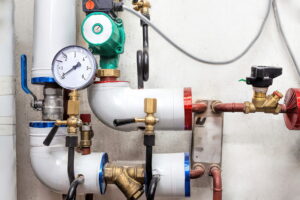In the realm of commercial heating systems, boilers have a long history of providing heat without the problems associated with blowing around heated air through a ventilation system. Boilers offer cleaner and more even warmth, and this makes an enormous difference for many facilities, particularly manufacturing plants and health care facilities.
Understanding the different types of commercial boilers and their respective uses is crucial for ensuring the best heating efficiency and performance in your facility. As a leader in commercial heating services in Chicagoland, Althoff Industries boasts over 60 years of expertise, offering comprehensive solutions for boiler installation, repair, and maintenance.
Understanding Commercial Boilers
Unlike furnaces, which use air to distribute heat, boilers use water or steam, making them indispensable in various industries: manufacturing, hospitality, healthcare, etc. Selecting the right type of boiler is paramount to ensure efficient heating while minimizing energy consumption and operational costs.
Types of Commercial Boilers
- Fire-Tube Boilers: These boilers feature a cylindrical shell filled with water and tubes that run through it. The heat produced by combustion travels through the tubes, heating the water and generating steam. Fire-tube boilers are commonly found in facilities with moderate heating requirements, such as schools, hospitals, and office buildings.
- Water-Tube Boilers: In contrast to fire-tube boilers, water-tube boilers circulate water through a series of tubes while hot gases from combustion pass around them. This design allows for higher pressure and temperature capabilities, making water-tube boilers suitable for industries with demanding heating needs, such as power generation and chemical processing plants.
- Electric Boilers: Electric boilers use electricity to generate heat, eliminating the need for traditional fuel sources such as natural gas or oil. These boilers are ideal for buildings where access to gas lines is limited or where emissions must be minimized. Electric boilers offer precise temperature control and are often used in commercial spaces such as hotels, restaurants, and laboratories.
- Condensing Boilers: Condensing boilers are designed to maximize energy efficiency by capturing and reusing heat from exhaust gases that would otherwise be wasted in conventional boilers. By condensing water vapor in the exhaust, these boilers extract additional heat, resulting in higher efficiency ratings. Condensing boilers are popular choices for environmentally conscious businesses seeking to reduce their carbon footprint and operating costs.
Matching Boilers to Commercial Needs
Selecting the right boiler for a commercial facility requires careful consideration of various factors, including heating requirements, space limitations, budget constraints, and environmental considerations. Consulting with our experienced professionals will streamline the decision-making process and ensure you choose the boiler that meets the unique needs of your facility.
With decades of experience in the commercial heating industry, Althoff Industries is committed to delivering superior boiler solutions tailored to each client’s specific requirements. From initial consultation and system design to installation, maintenance, and repair services, our team of experts offers comprehensive support throughout the lifespan of your boiler system. Whether you’re in need of a new boiler installation or require commercial boiler repair in Hillside, you can trust us to deliver reliable, cost-effective solutions backed by unmatched expertise.
Have boiler repair or boiler upgrade needs for your Commercial property in Chicagoland? Then contact Althoff Industries, Inc. Challenges Accepted!

